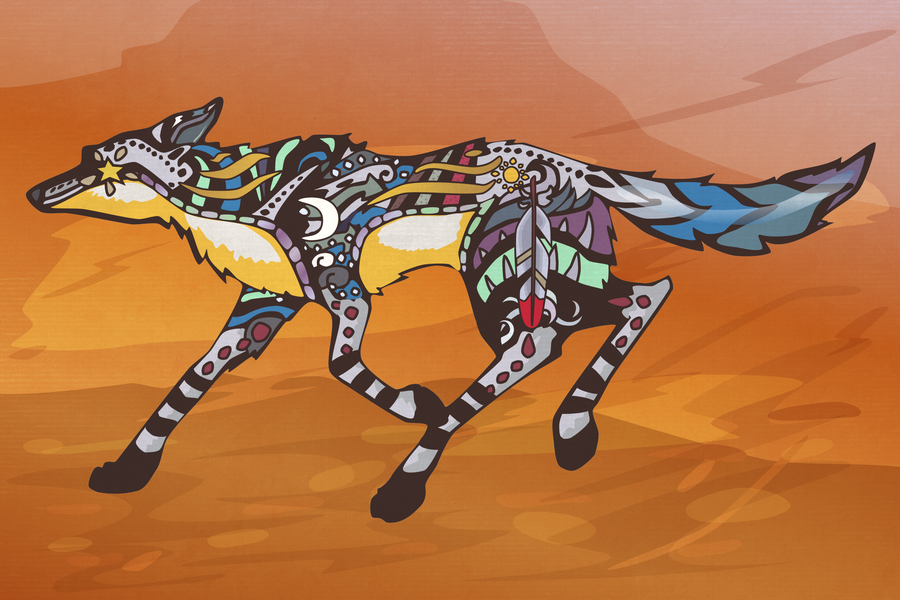Question 2: Coyote Pedagogy is a term sometimes used to describe King’s writing strategies (Margery Fee and Jane Flick). Discuss your understanding of the role of Coyote in the novel.

I wanted to begin by defining pedagogy because it’s not a word that commonly pops up in literary criticism and analyses. Pedagogy refers to the practice of teaching and the methods used to share knowledge. In many Indigenous cultures, Coyote represents an important trickster figure. Jane Flick’s reading notes for Green Grass, Running Water describe Coyote as being one of the “First People,” a race with “tremendous powers, [who] created the world as we know it… but [who] were also capable of being brave or worldly, conservative or innovative, wise or stupid” (143). From the first page of the novel, King makes clear the relationship of Coyote to the trickster figure; the narrator states that “when that Coyote dreams, anything can happen” (King, 1). The blending of Western and Indigenous is persistent throughout King’s novel. He compels readers to look beyond traditional cultural boundaries and ways of knowing, and in doing so, illustrates the limitations of only one way of knowing.
As we journey through the novel, Western policies, people, and culture are weaved in among Indigenous cultural references and humour. The inclusion of both makes it challenging for readers to understand everything, and I found myself needing the Internet many a time to research a particular word or person (not only Indigenous references but also for some of the Western references, especially related to Western films, which is a subject I’m not familiar with). King’s strategies of mixing imagery and allegory from distinct cultures really highlight how openminded and inquisitive readers need to be while reading. I can imagine this novel being assigned to a class where individuals (for various reasons) may be unable or unwilling to take the necessary time to find out what King is referencing. So much of the power created from King’s symbols would be lost.
In Green Grass, Running Water, Coyote challenges Western beliefs about creation. Coyote takes on the role of teacher and student. Often, his character is reminiscent of the childhood troublemaker most of us either were or witnessed, on the playground… humorous, egocentric, a bit erratic, eager to learn, fast acting (not always aware of the consequences of one’s actions), naughty, but generally well-intentioned. For example, Coyote frequently makes statements about himself that appear unrelated to the bigger things at play; he’s in his own little world:
“My favourite month is April,” says Coyote.
“That’s nice,” I says.
“I also like July,” says Coyote.
“We can’t hear what’s happening if you keep talking,” I says.
“I don’t care much for November,” says Coyote.
“Forget November,” I says. “Pay attention.” (King, 195)
Other times, though, Coyote appears as the teacher…
“Everything ‘s under control,” says Coyote. “Don’t panic.”
Where did all that water come from? shouts that GOD.
“Take it easy,” says Coyote. “Sit down. Relax. Watch some television.”
But there is water everywhere, says that GOD.
“Hmmmm,” says Coyote. “So there is.” (King, 3)
I think Coyote serves several roles throughout the novel. He challenges the status quo and traditional borders of knowledge. I view him almost as King’s attempt to guide readers; using Coyote, he illustrates what can be, if one is only willing to listen and be open to new ways of knowing.
Works Cited
“Coyote the Trickster.” Deaf Pagan Crossroads, ocean1025.files.wordpress.com/2007/06/coyote_the_trickster_by_coyoteflutesong-d36jxwl.png.
Flick, Jane. “Reading Notes for Thomas King’s Green Grass Running Water.” Canadian Literature 161-162. (1999). Web. Mar 07/2019.
King, Thomas. Green Grass, Running Water. Harper perennial Canada, 2007.
“Trickster.” The Canadian Encyclopedia, www.thecanadianencyclopedia.ca/en/article/trickster.
